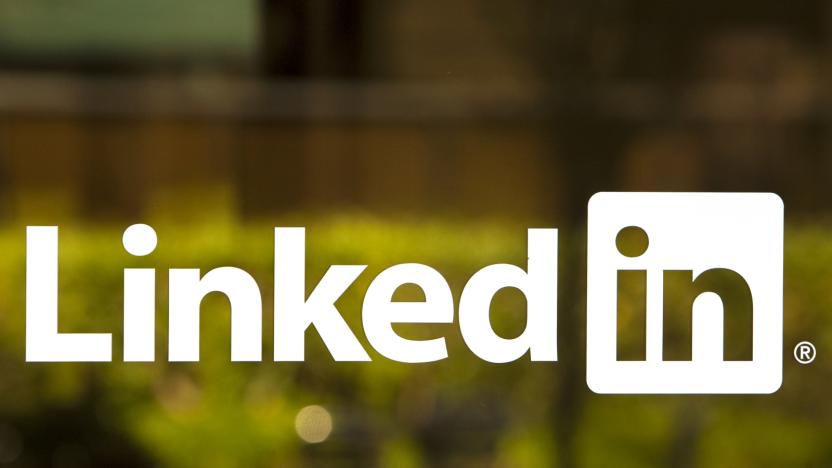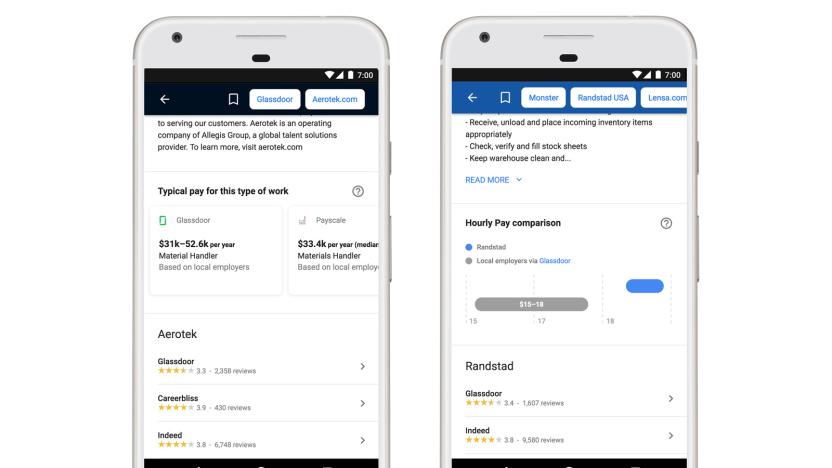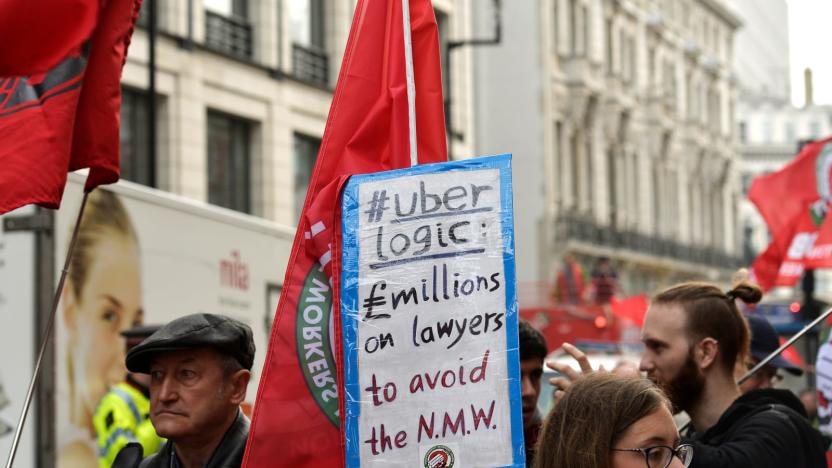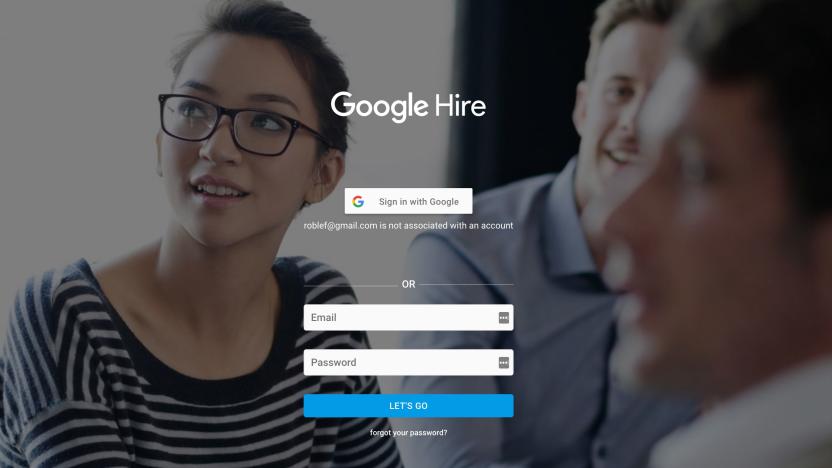employment
Latest

LinkedIn will tell you how far away your new job really is
Job-hunting can be a tedious process. Polishing your resume, collecting the right referees and attending interviews all take time. Aside from GIFs and Snapchatesque filters, LinkedIn has been enhancing its business-centric service with more practical things like smart replies and the ability to ask connections for referrals. Its newest feature, 'Your Commute', aims to hit another serious target: streamlining your employment search.

Google adds salaries to its job search tool
Google already has some tools to help you find a job, but there's been a missing ingredient: salaries. How do you know whether or not it's worth pursuing a new role short of visiting another website? You shouldn't have to worry much longer. Google is adding a suite of new job search tools, most notably salary info. In many cases, Google will display estimated salary ranges plucked from multiple sources (including Glassdoor, LinkedIn and PayScale) whether or not the listing itself mentions pay. If a position represents a big raise, you'll know very quickly.

Appeal tribunal rules Uber drivers are definitely workers
Is Uber a taxi firm or a technology company, and are its drivers self-employed or mistreated employees? These questions are being asked of Uber the world over, and last year an employment tribunal case in the UK concluded two drivers were, in fact, entitled to minimum wage, holiday pay and other benefits. The ride-hailing service contested this potentially precedent-setting decision, as you'd expect, but today Uber lost its appeal. In other words, the appeal tribunal upheld the original ruling that drivers should be classed as workers rather than self-employed.

Intel's diversity report shows slow growth for women and minorities
Intel CEO Brian Krzanich condemned hate speech and white supremacy on Twitter after the horrifying events in Charlottesville this weekend. On Monday, he resigned from Trump's American Manufacturing Council to "call attention to the serious harm our divided political climate is causing to critical issues..." Now, alongside a mid-year diversity report that documents some slow and flat growth in diversity at Intel, Krzanich is touting his company's "fast march" toward the full representation of women and unrepresented minorities in Intel's US-based workforce by 2018. That's only one year away.

Google Search will help you find your next job
Finding a new job can be tough. With so many recruitment sites to keep track of, it can be difficult to know what's out there, never mind applying and getting through the interview process. Now, there's a new way to keep tabs on the work in your local area: Google. An update to Search on desktop and mobile allows you to, well, search for new employment with conversational queries like "jobs near me" and "teaching jobs." You'll then see a list of results from across the web, each of which includes the company's name, the role, the hours and when the job was posted.

Google quietly takes on LinkedIn with its own job listings site
Google has a new job listings portal coming online soon, adding yet another site you'll need to upload your resume to. You can even visit the Google Hire site now, though it won't let you sign in, yet. According to Axios, Hire will enable companies to post job listings and individuals to search for and find their next job.

New York City expands program linking students to tech jobs
If you ask New York City, the Tech Talent Pipeline is a shining star in its technology education efforts. The program helps students find internships and training that get them cushier tech jobs when they graduate, and it appears to be paying off -- the average starting salary among participants has gone up 34 percent, and 96 percent of first-wave graduates landed jobs. Accordingly, the city is expanding the partnerships for the Pipeline to give more students a chance. The wider participation includes new schools, companies and charitable donations.

Bill Gates wants a robot tax to compensate for job losses
How would you deal with the likelihood that robots and automation will likely lead to many people losing their jobs? For Microsoft co-founder Bill Gates, the answer is straightforward: tax the robots. In an interview with Quartz, Gates argues that taxing worker robots would offset job losses by funding training for positions where humans are still needed, such as child and senior care. It could even slow automation to a more manageable rate, if necessary.

Facebook now lets companies post job listings
You might not have to visit LinkedIn or a dedicated job site to climb up the career ladder. Facebook has started rolling out support for job listings on company pages, starting with the US and Canada in the next few weeks. It not only puts jobs in front of more eyeballs (namely the world's largest social network), but promises to streamline many of the usual headaches for both job seekers and recruiters. It can automatically fill in a form with details from your Facebook profile, and you can hear back from your potential employer through Messenger.

Amazon bringing 100,000 full-time jobs to the US by 2018
Amazon is about to go on a huge hiring spree, adding over 100,000 "full time, full-benefit" US jobs. They'll be available to people with "all types of experience, education and skill levels," the company wrote, ranging from engineers and software developers to entry-level fulfillment center positions. "Innovation is one of our guiding principles at Amazon, and it's created hundreds of thousands of American jobs," CEO Jeff Bezos said in a statement.

Google sued by US government for not sharing employee salaries
The U.S Department of Labor is suing Google after the company declined to share employment data with the government. In its complaint, the department claims that Google refused to reveal employee salaries and benefits to the Office of Federal Contract Compliance Programs (OFCCP) during a routine anti-discrimination audit. The OFCCP is now seeking a court order to force the tech giant to comply.

Microsoft executive bonuses could soon be tied to diversity goals
When we graded Microsoft on its employee diversity last year, its report card wasn't exactly stellar. Despite filling out its leadership team with more women and ethnic minorities than ever in its history, the diversity of the company's general ranks fell year over year. Microsoft's final grade was a solid C. Not awful, but plenty of room for improvement. Satya Nadella seems to agree: the company's CEO plans to make diversity a core business value moving forward -- to the point that executive bonuses may hinge on the company meeting its diversity goals.

Google's been recruiting programmers based on their search habits
Want a job slinging code for Google? You might already be on the company's radar. According to new Google hire Max Rosett, he never applied for a job at Google -- the company reached out to him after he made a habit of using Google search as a programming resource. One day, a search for "python lambda function list comprehension" returned something unexpected: a secret Google recruitment test.

LinkedIn's Lookup app finds co-workers with the right skills
LinkedIn doesn't just want to help you find a job or a new hire -- it thinks it can contribute even after you're gainfully employed. The company's new LinkedIn Lookup app for iPhones (there's no mention of Android yet) helps you find and contact co-workers using criteria ranging from names to skill sets. That could be particularly handy if you're trying to find someone outside your department with the right experience, or if you're just curious about that new CEO. Think of Lookup as a lightweight, inter-office social network. It won't replace Facebook or group chat systems like Slack, but it could be the easiest way to introduce yourself to your fellow staffers.

Hillary Clinton isn't a fan of Uber-style contracted workers
Like it or not, the hiring practices of on-demand internet companies just became an election issue. Presidential candidate Hillary Clinton has outlined her economic policies, and it's clear that she's not fond of Uber and other firms relying on contracted workers instead of regular employees. While she believes that these demand-based outfits are "unleashing innovation," their labor practices allegedly amount to "wage theft." They're depriving people of vital benefits like paid maternity leave and sick days, Clinton says. She's not specific about how she'd solve this dilemma, but she believes that policies could "fix" the situation and give some workers a stronger safety net.

Shyp helps reverse a tech trend by hiring contractors as staff
Tech companies like Uber may be fighting tooth and nail to keep their workers as contractors and avoid dealing with costs like insurance and taxes, but Shyp isn't having any of that. The shipping service has announced that it's treating all of its couriers as full-fledged employees, with all the benefits and covered expenses that come along for the ride. As the company explains, this isn't about thumbing a nose at anyone. Instead, the focus is on "owning" the whole experience and improving what you get. It's only really possible to offer better supervision and training to dedicated staff, Shyp's CEO says. Also, he's betting that this will pay dividends down the road as you deal with more committed, experienced couriers.

California labor commission rules Uber drivers are employees (update: Uber responds)
The California labor commission has ruled that an Uber driver qualifies as an employee, not a contractor, of the company. As a result Uber will have to reimburse a driver for expenses accumulated in the line of duty. That includes $256 in tolls and the IRS rate of $0.56 per mile for use of a personal vehicle for business purposes. But the total award of $4,152.20 is not what scares the company, that's pocket change seeing as how it was recently valued at roughly $50 billion. No, the king of cars-for-hire is afraid of the broader implications. If their current network of over one million drivers suddenly became employees, running the business could get a lot more expensive. For one, companies need to pay social security, payroll and medicare taxes for their employees. And it could have implications for the expectation of health or retirement benefits and even leave Uber vulnerable to renewed pressure from taxi unions. Of course, Uber is appealing the ruling and could keep this issue tied up in court for sometime. Plus, this ruling only applies in California for the time being, but it could be an omen of more trouble waiting on the horizon. [image credit: AP Photo/Eric Risberg]

You can use Twitter activity to track unemployment
Governments aren't usually quick to react to changes in demographics. They frequently have to take surveys that are not only slow, but don't always paint a complete picture of what's going on. Researchers at the Autonomous University of Madrid have discovered a far more effective way of keeping tabs on the population, however: tracking Twitter updates. They've found that the content, frequency and timing of tweets across Spain correlate well with joblessness levels in their respective regions. People in high unemployment areas tend to not only mention jobs more often in their posts, but tweet more in the morning and make a larger number of spelling mistakes. Since it's both easy and quick to collect that information, it's possible to track economic patterns almost as they happen -- you can see when a financial crisis hits a city hard, or when there's a job boom.

Research confirms minorities earn significantly less in skilled tech jobs
There's no denying that wage inequality is a terrible thing, and it's not just limited to blue-collar trades. The tech industry's so-called high-skilled positions -- like programmers and developers -- pay minorities much less than their Caucasian colleagues. Sure, the issue is certainly nothing new, but a recent USA Today report details the finer points, with figures from the American Institute for Economic Research. According to that latter outfit's findings, on average Hispanic males earn $16,353 less than white males per year, with Asian males making $8,146 less and black males netting $3,656 less, respectively, in those tech jobs. Of course, women face similar issues in terms of salary, on top of being massively outnumbered when it comes to positions in Silicon Valley. In fact, females in each ethnicity group researched earned less than their male counterparts. While companies are looking to combat the gender gap with mentor programs and more, the inconsistency in earnings is also a huge issue that needs to be tackled for both men and women across a range of ethnicities.

Unconscious bias is why we don't have a diverse workplace, says Google
Statistics don't lie: If you're working at a Silicon Valley tech company, you're probably a guy. It's a big problem -- most corporate-diversity reports show a male-dominated industry, and colleges are struggling to find new ways to enroll women in computer science and technology programs. It's not just a matter of attracting minorities to technology, however. Google says part of the problem is in our mind: a shared, unconscious bias that not only affects the makeup of Silicon Valley's workforce, but also affects what markets technology company's products reach.









